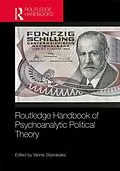The emerging field of 'psychoanalytic political theory' has now reached a stage in its development and rapid evolution that deserves to be registered, systematically defined and critically evaluated. This Handbook provides the first reference volume which showcases the current state of psychoanalytic political theory, maps the genealogy of its development, identifies its conceptual and methodological resources and highlights its analytical innovations as well as its critical promise. The Handbook consists of 35 chapters offering original, comprehensive and critical reviews of this field of study. The chapters are divided into five thematic sections:
- Figures discusses the work of major psychoanalytic theorists who have influenced considerably the development of psychoanalytic political theory.
- Traditions genealogically recounts and critically reassesses the many attempts throughout the 20th century of experimenting with the articulation between psychoanalysis and political theory in a consistent way.
- Concepts asks what are the concepts that psychoanalysis offers for appropriation by political theory.
- Themes presents concrete examples of the ways in which psychoanalytic political theory can be productively applied in the analysis of racism, gender, nationalism, consumerism, etc.
- Challenges/Controversies captures the ways in which psychoanalytic political theory can lead the way towards theoretical and analytical innovation in many disciplinary fields dealing with cutting-edge issues.
The Routledge Handbook of Psychoanalytic Political Theory will serve as scholarly reference volume for all students and researchers studying political theory, psychoanalysis, and the history of ideas.
Autorentext
Yannis Stavrakakis studied political science in Athens and Essex. He has worked at the Universities of Essex and Nottingham before taking up a position at the Aristotle University of Thessaloniki in 2006. His research focuses primarily on contemporary political theory (with emphasis on psychoanalytic and post-structuralist approaches) and on the analysis of ideology and discourse in late modern societies (with emphasis on populism, environmentalism, post-democracy and the role of artistic practices).
Editorial Board: Stephen Frosh, Lynne Layton, and Dany Nobus
Inhalt
Introduction
Yannis Stavrakakis
PART 1: FIGURES
1. Sigmund Freud
Stephen Frosh
2. Melanie Klein
R. D. Hinshelwood
3. Jacques Lacan
Domiek Hoens
4. Wilhelm Reich
Christopher Turner
5. Carl Jung
Peter T. Dunlap
PART 2: TRADITIONS
6. Marcuse and the Freudian Left
Douglas Kellner
7. The Lacanian Left
Sean Homer
8. Psychoanalytic Feminism
Lisa Baraitser
9. Critical Management Studies
Alessia Contu
PART 3: CONCEPTS
10. Superego and the Law
Todd McGowan
11. (Liberal) Narcissism
Bob Samuels
12. Affect and Emotion
Candida Yates
13. Trauma
Marshal Alcorn
14. Fantasy
Matthew Sharpe and Kirk Turner
15. Identification (With the Aggressor)
Jay Frankel
16. Mourning and Melancholia
Claudia Lapping
17. Language and Discourse
Ed Pluth
18. Collective Subjects
Campbell Jones
PART 4: THEMES
19. Sexuality
Eran Dorfman
20. Hate
C. Fred Alford
21. Racism
Derek Hook
22. Nationalism
Amanda Machin
23. Capitalism
Samo Tomsic
24. Consumerism and Choice
Renata Salecl
25. Religion and Islamic Radicalization
Andrea Mura
26. Populism
Paula Biglieri and Gloria Perello
27. Arts
Cecilia Sjoholm
PART 5: CHALLENGES AND CONTROVERSIES
28. Psychoanalytic Geopolitics
Dany Nobus
29. Psy Ethics
Ian Parker
30. Neoliberalism
Valerie Walkerdine
31. Migration and Diversity
Nikolay Mintchev and Hernrietta Moore
32. Biopolitics
A. Kiarina Kordela
33. The Climate Crisis
Sally Weintrobe
34. Post-politics
Olivier Jutel
35. Posthuman Identities
Anthony Elliott
